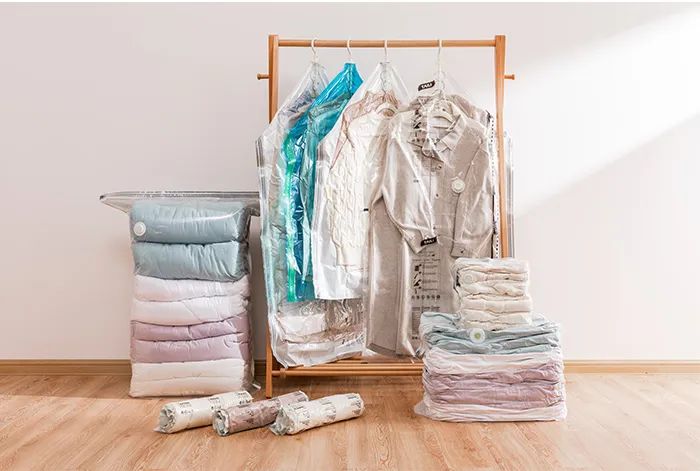When sourcing vacuum compression bags, choosing the right factory is crucial for product quality, sustainability, and long-term business success. Here’s what to consider when evaluating a manufacturer:

1. Experience & Industry Reputation
- How long has the factory been in operation?
- Do they specialize in vacuum storage solutions, or is it a side product?
- Check customer reviews, case studies, and industry references.
2. Material Quality & Sustainability
- What materials do they use? (e.g., PET/PE, biodegradable options)
- Are their materials durable, puncture-resistant, and eco-friendly?
- Do they offer recycled or low-carbon footprint alternatives?
3. Production Capacity & Lead Times
- Can they handle bulk orders without compromising quality?
- What are their average lead times? (Critical for inventory planning)
- Do they have contingency plans for supply chain disruptions?
4. Customization & OEM/ODM Services
- Can they produce custom sizes, thicknesses, or branding?
- Do they offer design support for unique market needs?
5. Compliance & Ethical Manufacturing
- Are they certified (ISO, BSCI, OEKO-TEX)?
- Do they follow fair labor practices?
- Are their facilities audited for environmental and safety standards?
A reliable factory should balance quality, efficiency, and ethical production—key factors for brands like Taili that prioritize innovation and sustainability.
Understanding the Manufacturing Process of Vacuum Compression Bags
High-quality vacuum storage bags depend on precise manufacturing. Here’s how they’re made and why each step matters:
1. Raw Material Selection
- Why it matters: Determines durability and eco-friendliness.
- Common materials:
- Multi-layer PET/PE – Balances strength and airtightness.
- Eco-friendly films – For biodegradable or recyclable options.
2. Film Extrusion & Lamination
-
Step-by-step process:
- Plastic pellets are melted and extruded into thin films.
- Multiple layers are laminated for enhanced barrier properties.
3. Cutting & Sealing
- Precision cutting ensures uniform bag sizes.
- High-frequency welding creates airtight seams.
4. Valve & Accessory Integration
- One-way valves are attached for vacuum pump compatibility.
- Zippers or double-seal closures are added for usability.
5. Quality Testing
-
Common tests:
- Air retention (submerged bubble test).
- Tensile strength (resistance to tearing).
- Valve functionality (efficiency in air removal).
Understanding these steps helps brands like Taili select factories that prioritize precision and material innovation.
The Role of Certifications in Choosing a Vacuum Compression Bag Factory
Certifications validate a factory’s credibility. Here’s why they matter:
Why Certifications Are Important
- Ensures compliance with safety and environmental regulations.
- Reduces risk of substandard materials or unethical labor practices.
- Builds buyer trust, especially for eco-conscious brands.
Key Certifications to Look For
- ISO 9001 – Quality management assurance.
- OEKO-TEX® – Confirms materials are free from harmful chemicals.
- CE Marking – Indicates compliance with EU safety standards.
- BSCI/SA8000 – Ethical labor practices certification.
How to Verify Certifications
- Request audit reports or certification copies.
- Cross-check with issuing bodies (e.g., TÜV, SGS).
For Taili, partnering with certified factories ensures alignment with our commitment to sustainable, high-performance home storage solutions.
Comparing Domestic vs. International Vacuum Compression Bag Factories
Sourcing locally or overseas? Here’s a breakdown:
Domestic Factories
✅ Pros:
- Faster shipping and lower logistics costs.
- Easier communication and quality control visits.
- Supports local economies.
❌ Cons:
- Higher per-unit costs compared to Asia-based suppliers.
- Limited specialization in some materials or processes.
International Factories (e.g., China, Vietnam)
✅ Pros:
- Lower production costs (economies of scale).
- Advanced manufacturing expertise in bulk orders.
- Wider material options (e.g., eco-friendly films).
❌ Cons:
- Longer lead times and import duties.
- Potential language/cultural barriers.
How to Decide?
- For speed & small batches: Domestic may be better.
- For cost efficiency & scalability: International often wins.
Taili’s global supply chain strategy balances both, ensuring competitive pricing without compromising sustainability.
How to Assess the Quality of Vacuum Compression Bags from a Factory
Not all vacuum bags perform equally. Here’s how to evaluate quality before ordering:
1. Material Inspection
- Thickness (measured in microns; 80–120 is ideal for durability).
- Layers (3–7 layers prevent leaks better than single-ply).
2. Air Retention Test
- Submerge an inflated bag underwater—no bubbles should appear.
3. Valve Efficiency
- Use a vacuum pump; air should not re-enter after sealing.
4. Seam Strength
- Apply pressure to seams; poorly welded bags split easily.
5. Third-Party Lab Reports
- Request tensile strength and elongation test results.
For brands like Taili, rigorous quality checks ensure products meet consumer expectations for longevity and performance.
Each section provides actionable insights while reinforcing Taili’s expertise in sustainable home storage solutions. Let me know if you’d like any refinements!








